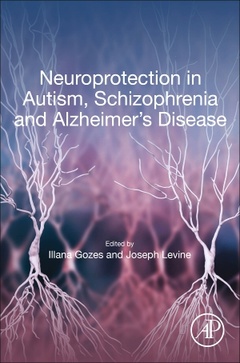Description
Neuroprotection in Autism, Schizophrenia and Alzheimer's disease
Coordinators: Gozes Illana, Levine Joseph
Language: English
Subjects for Neuroprotection in Autism, Schizophrenia and Alzheimer's...:
322 p. · 15x22.8 cm · Paperback
Description
/li>Contents
/li>Readership
/li>Biography
/li>Comment
/li>
Neuroprotection in Autism, Schizophrenia and Alzheimer's Disease provides an up-to-date overview on recent clinical studies and the similarities discovered in the most prevalent brain disorders. The book's content will help shed light on basic mechanisms and provide new avenues for early diagnosis toward disease prevention and disease modification. It is written for researchers, clinicians and medical physicians in neuroscience, neurology and psychiatry. Sections discuss the shared pathophysiological mechanisms that underlie autism, schizophrenia/mood disorders and Alzheimer?s disease, i.e. neurodevelopmental disorders, neuropsychiatric diseases and neurodegenerative disorders.
Section I. Overview 1. Activity-dependent neuroprotective protein (ADNP)/NAP (CP201): autism, schizophrenia and Alzheimer’s disease 2. Clinical convergence of autism, schizophrenia and Alzheimer’s disease: The case of social cognition
Section II. Autism 3. A contemporary view on the molecular basis of neurodevelopmental disorders 4. Autism spectrum disorder - A clinical path to early diagnosis, evaluation and intervention 5. Neuro-inflammation and neuroprotection in schizophrenia and autism spectrum disorder
Section III. Neuropsychiatric Disorders 6. Neuroprotective roles of neurotrophic factors in depression 7. Neuroprotective roles of neurotrophic growth factors in mood disorders 8. Heme metabolism, mitochondria and complex I in neuropsychiatric disorders 9. Neuroprotective effects of lithium in neuropsychiatric disorders
Section IV. Alzheimer and Neurodegenerative Diseases 10. Tau-based therapies for Alzheimer´s disease: promising novel neuroprotective approaches 11. Acetylation of tubulin: a feasible protective target from neurodevelopment to neurodegeneration?
researchers, clinicians, and medical physicians in neuroscience, neurology, and psychiatry
Prof. Emeritus Joseph Levine is a dedicated researcher and a specialist in psychiatry with more than 35 years of experience in Psychiatry. Prof. Levine is a former Director of adul
- Offers an up-to-date overview of basic and clinical studies concerning similarities in the most prevalent brain disorders
- Helps the reader become familiar with novel neuroprotective mechanisms and experimental treatment modalities in these difficult to treat disorders
- Written for researchers, clinicians and medical physicians in neuroscience, neurology and psychiatry
These books may interest you

The Microbiome and the Brain 56.31 €



